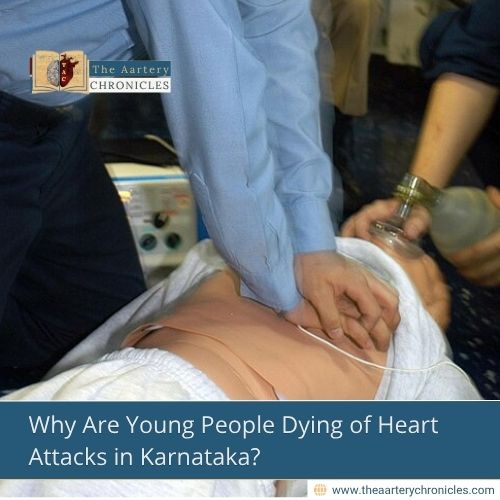

Why Are Young People Dying of Heart Attacks in Karnataka?
Karnataka has reported a sudden rise in heart-related deaths, particularly among people under 40. This unexpected spike has triggered urgent investigations by the state government and leading cardiology experts in the Hassan and Mysuru regions.
At least 18 cardiac-related deaths were reported in Hassan district alone between May 28 and June 28, 2025, prompting a formal inquiry. A dedicated committee led by Dr. K.S. Ravindranath, Director of Sri Jayadeva Institute of Cardiovascular Sciences and Research, Bengaluru, is working in collaboration with the Hassan Institute of Medical Sciences (HIMS) to examine the situation.
The committee is expected to submit a detailed report within 10 days, according to Karnataka’s Chief Minister Siddaramaiah, who assured the public that the government will review the findings and take suitable actions.
Most Deaths Occurred at Home Without Medical Help
According to Dr. Rajanna B, Director of HIMS, 14 out of the 18 people died at home without consulting any doctor. Of these, around 9 were under 30 years of age, while most of the others were over 50.
Unfortunately, many of these deaths happened too long ago to allow for post-mortem examinations. As a result, investigators are now relying heavily on medical history records and first-hand accounts from local doctors and families to understand the cause and pattern.
Young, Asymptomatic Patients Increasing in Hospitals
What’s even more troubling is the increase in young patients with heart attacks who show no warning signs or known risk factors.
Dr. K.S. Sadananda, Superintendent at Jayadeva Hospital, Mysuru, stated:
“Every day, we are seeing 3–4 young patients suffering from heart attacks. Many have no prior symptoms or known health conditions.”
In earlier years, most cardiac cases were tied to chronic health issues such as hypertension, diabetes, obesity, or lifestyle factors like smoking. However, this recent wave suggests a new and more unpredictable trend.
Hospitals with Rising Cardiac Cases
The anxiety around these sudden deaths is visible among the public.
Emergency departments at Jayadeva Hospitals in Bengaluru and Mysuru have seen a 20% increase in footfall, especially from younger individuals seeking preventive heart checks.
Additionally, general OPDs saw 200–300 more outpatients than usual in just one day, according to Dr. Ravindranath.
Study Launched by Cardiological Society of India (CSI), Mysuru
In response to the growing concern, the Mysuru chapter of the Cardiological Society of India (CSI) has begun a comprehensive study to investigate the rise in heart disease among younger populations.
Led by Dr. Shashirekha (President) and Dr. Veena Nanjappa (Secretary), the study will collect data over two years from both government and private hospitals, including Narayana Hrudayalaya, Manipal, BGS Apollo, and others.
The objective is to identify patterns, assess risk factors, and recommend preventive strategies to the state government.
“Not a New Trend,” Says Senior Cardiologist Dr. CN Manjunath
While the spike has sparked fear and speculation, Dr. CN Manjunath, a noted cardiologist and MP from Bangalore Rural, offered a broader perspective.
He emphasized that young and middle-aged adults have been at risk for heart attacks for over two decades.
During his tenure at Jayadeva Hospital from 2013 to 2018, he studied 5,000 young heart attack patients (ages 20–45). The findings showed:
- 50% were smokers
- 18–20% had diabetes and high blood pressure
- 17% had a strong family history of early heart disease
- Alarmingly, 25% had no traditional risk factors at all
Dr. Manjunath urged public health authorities to investigate other environmental triggers. He specifically called for the Food Safety Department to assess pesticide residues in fruits and vegetables, which could be contributing to silent damage to cardiovascular health.
Conclusion
These recent developments underscore the need for:
- Early and regular heart health screenings, even in younger people
- Increased awareness about hidden or non-traditional risk factors
- Greater attention to lifestyle, diet, and environmental exposures
The full report from the investigative committee and the CSI’s long-term study will be key in uncovering the root causes and shaping future public health responses.
Healthcare professionals urge everyone especially the younger population not to ignore symptoms like chest pain, breathlessness, or fatigue, and to seek timely medical advice even if they feel generally healthy.
Source: Inputs from various media Sources

Priya Bairagi
Reviewed by Dr Aarti Nehra (MBBS, MMST)
I’m a pharmacist with a strong background in health sciences. I hold a BSc from Delhi University and a pharmacy degree from PDM University. I write articles and daily health news while interviewing doctors to bring you the latest insights. In my free time, you’ll find me at the gym or lost in a sci-fi novel.








